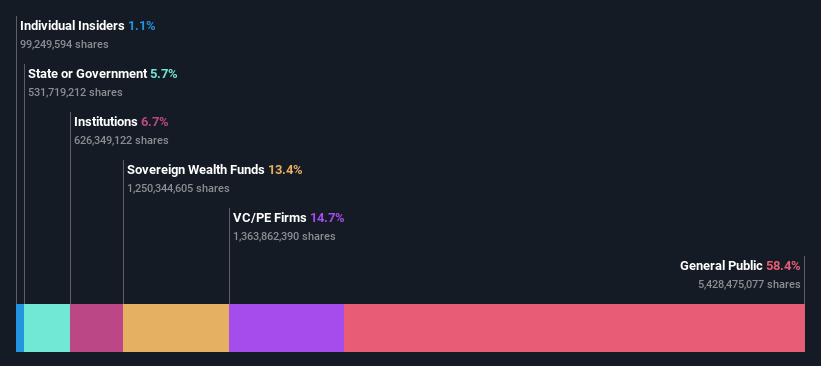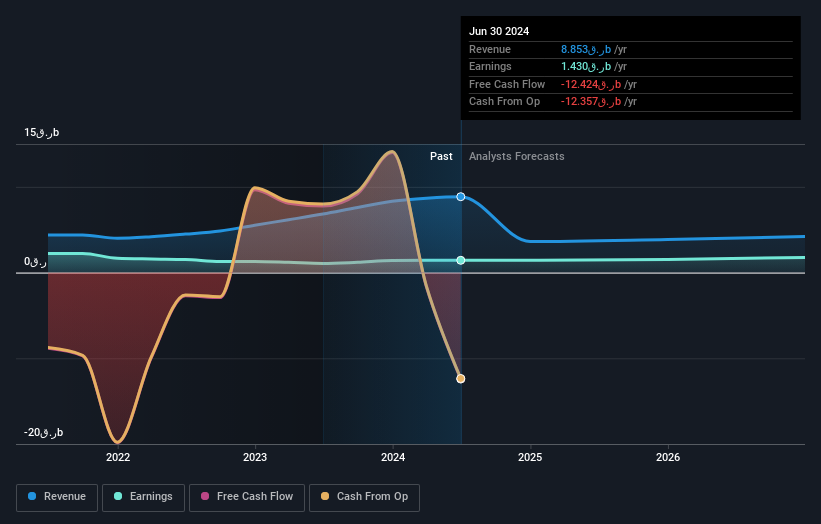Masraf Al Rayan (Q.P.S.C.) (DSM:MARK) stock most popular amongst retail investors who own 58%, while private equity firms hold 15%

Key Insights
- Masraf Al Rayan (Q.P.S.C.)'s significant retail investors ownership suggests that the key decisions are influenced by shareholders from the larger public
- The top 25 shareholders own 41% of the company
- Analyst forecasts along with ownership data serve to give a strong idea about prospects for a business
A look at the shareholders of Masraf Al Rayan (Q.P.S.C.) (DSM:MARK) can tell us which group is most powerful. The group holding the most number of shares in the company, around 58% to be precise, is retail investors. Put another way, the group faces the maximum upside potential (or downside risk).
Meanwhile, private equity firms make up 15% of the company’s shareholders.
Let's delve deeper into each type of owner of Masraf Al Rayan (Q.P.S.C.), beginning with the chart below.
See our latest analysis for Masraf Al Rayan (Q.P.S.C.)

What Does The Institutional Ownership Tell Us About Masraf Al Rayan (Q.P.S.C.)?
Institutions typically measure themselves against a benchmark when reporting to their own investors, so they often become more enthusiastic about a stock once it's included in a major index. We would expect most companies to have some institutions on the register, especially if they are growing.
Masraf Al Rayan (Q.P.S.C.) already has institutions on the share registry. Indeed, they own a respectable stake in the company. This suggests some credibility amongst professional investors. But we can't rely on that fact alone since institutions make bad investments sometimes, just like everyone does. If multiple institutions change their view on a stock at the same time, you could see the share price drop fast. It's therefore worth looking at Masraf Al Rayan (Q.P.S.C.)'s earnings history below. Of course, the future is what really matters.

Masraf Al Rayan (Q.P.S.C.) is not owned by hedge funds. Our data shows that Qatar Holding LLC is the largest shareholder with 15% of shares outstanding. Meanwhile, the second and third largest shareholders, hold 7.5% and 5.9%, of the shares outstanding, respectively.
On studying our ownership data, we found that 25 of the top shareholders collectively own less than 50% of the share register, implying that no single individual has a majority interest.
Researching institutional ownership is a good way to gauge and filter a stock's expected performance. The same can be achieved by studying analyst sentiments. There are plenty of analysts covering the stock, so it might be worth seeing what they are forecasting, too.
Insider Ownership Of Masraf Al Rayan (Q.P.S.C.)
The definition of company insiders can be subjective and does vary between jurisdictions. Our data reflects individual insiders, capturing board members at the very least. Company management run the business, but the CEO will answer to the board, even if he or she is a member of it.
Most consider insider ownership a positive because it can indicate the board is well aligned with other shareholders. However, on some occasions too much power is concentrated within this group.
Shareholders would probably be interested to learn that insiders own shares in Masraf Al Rayan (Q.P.S.C.). It is a pretty big company, so it is generally a positive to see some potentially meaningful alignment. In this case, they own around ر.ق234m worth of shares (at current prices). It is good to see this level of investment by insiders. You can check here to see if those insiders have been buying recently.
General Public Ownership
The general public -- including retail investors -- own 58% of Masraf Al Rayan (Q.P.S.C.). This level of ownership gives investors from the wider public some power to sway key policy decisions such as board composition, executive compensation, and the dividend payout ratio.
Private Equity Ownership
With an ownership of 15%, private equity firms are in a position to play a role in shaping corporate strategy with a focus on value creation. Some might like this, because private equity are sometimes activists who hold management accountable. But other times, private equity is selling out, having taking the company public.
Next Steps:
I find it very interesting to look at who exactly owns a company. But to truly gain insight, we need to consider other information, too. Consider risks, for instance. Every company has them, and we've spotted 1 warning sign for Masraf Al Rayan (Q.P.S.C.) you should know about.
But ultimately it is the future, not the past, that will determine how well the owners of this business will do. Therefore we think it advisable to take a look at this free report showing whether analysts are predicting a brighter future.
NB: Figures in this article are calculated using data from the last twelve months, which refer to the 12-month period ending on the last date of the month the financial statement is dated. This may not be consistent with full year annual report figures.
New: Manage All Your Stock Portfolios in One Place
We've created the ultimate portfolio companion for stock investors, and it's free.
• Connect an unlimited number of Portfolios and see your total in one currency
• Be alerted to new Warning Signs or Risks via email or mobile
• Track the Fair Value of your stocks
Have feedback on this article? Concerned about the content? Get in touch with us directly. Alternatively, email editorial-team (at) simplywallst.com.
This article by Simply Wall St is general in nature. We provide commentary based on historical data and analyst forecasts only using an unbiased methodology and our articles are not intended to be financial advice. It does not constitute a recommendation to buy or sell any stock, and does not take account of your objectives, or your financial situation. We aim to bring you long-term focused analysis driven by fundamental data. Note that our analysis may not factor in the latest price-sensitive company announcements or qualitative material. Simply Wall St has no position in any stocks mentioned.
About DSM:MARK
Masraf Al Rayan (Q.P.S.C.)
Engages in Islamic banking, financing, and investing activities.
Proven track record second-rate dividend payer.

